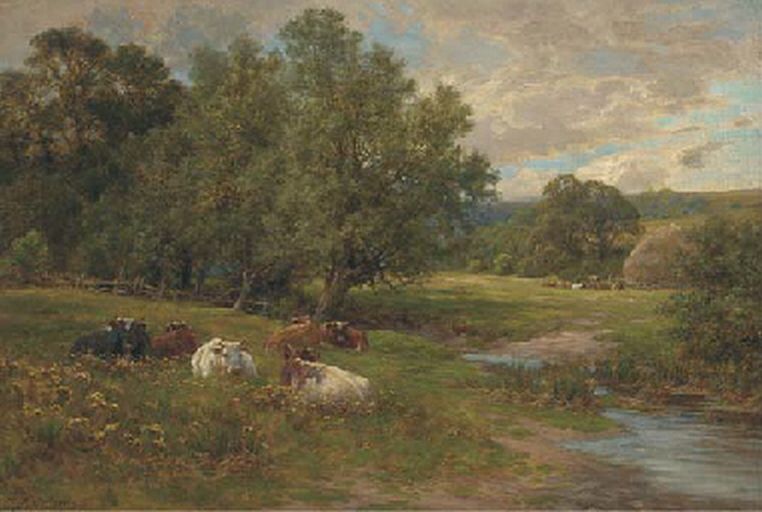
Work has been around from the beginning of time. God worked for six days creating the universe, the world, and everything in them. He also gave man work to do even before the fall and curse. And in addition to man’s work in taking dominion of the earth he is to put the creation to work.
In the beginning, in addition to instituting work, God set a pattern that work should not be done continuously. The work that we do should be broken up with regular periods of rest. Rest is not just an inconvenient necessity that is the result of getting tired, because God doesn’t tire and yet he rested the seventh day after creating. Instead, it is a pattern by which we acknowledge our dependence upon the Lord.
Rest and Scripture
In Scripture there are many examples of rest. Let’s look at a few of them.
“Remember the Sabbath day by keeping it holy. Six days you shall labor and do all your work, but the seventh day is a Sabbath to the LORD your God. On it you shall not do any work, neither you, nor your son or daughter, nor your manservant or maidservant, nor your animals, nor the alien within your gates. For in six days the LORD made the heavens and the earth, the sea, and all that is in them, but he rested on the seventh day. Therefore the LORD blessed the Sabbath day and made it holy.
Exodus 20:8-11
We see that the pattern of resting every seventh day was established by God. And it didn’t just apply to people, but also to animals as well.
But in the seventh year the land is to have a sabbath of rest, a sabbath to the LORD. Do not sow your fields or prune your vineyards. Do not reap what grows of itself or harvest the grapes of your untended vines. The land is to have a year of rest. Leviticus 25:4,5
Not only are we and our animals to rest, but the land is to rest. Continuous work is not consistent with the way God set things up to work. If anything works, including animals or land, then it must rest.
Six days do your work, but on the seventh day do not work, so that your ox and your donkey may rest and the slave born in your household, and the alien as well, may be refreshed. Exodus 23:11,12
Apparently one reason that God wants us to rest is so that we may be refreshed from the toil of our work. God doesn’t need refreshing, he is the source of refreshing, but because we are fallible and effected by the curse of sin, we need times of rest for refreshing.
The source of true rest is the Lord Jesus Christ. We will never find true rest apart from him. Hebrews 4 also speaks of the coming Sabbath Rest for God’s people, when they will rest from all the toil of this life.
Six days you shall labor, but on the seventh day you shall rest; even during the plowing season and harvest you must rest.
Exodus 34:21
The principle of resting helps cultivate in our hearts a trust in the Lord and confidence in his provision. Sometimes we may be tempted to think that there are times we need to work and can’t afford to rest. Well, I believe one of the reasons God wants us to rest is to be reminded that we are dependent on him for provision, not in our own strength and ability to work.
Rest and Creation
Now, when we look at untended creation, it obviously doesn’t rest from being worked by man because it hasn’t been. But I believe we still see the same principle of rest at ‘work’ 🙂
For one thing, from what I have observed in creation few, if any, living creatures work all the time. Most animals work either during the day or night and rest during the other. Most plants grow during one part of the season, and seemingly rest during the other.
Also, we see the detremental effects of man overworking the land without rest. Erosion. Decrease in fertility. Buildup of disease in the soil. These all provide evidence that a lack of rest is not a good thing, and therefore, not what God desires.
Rest Doesn’t Mean Neglect
Now, I think I need to clarify here what I believe Biblical rest means. We can probably all agree that the Bible clearly states rest to mean stopping work. As we see in the passages above, when God says to rest on the Sabbath he goes on to explain that no work shall be done on it. However, what exactly does that look like? Does it mean that we shouldn’t get out of bed? Or cook meals? Does it mean that we shouldn’t feed our animals?
Well, let’s first clarify what is meant by work. Work is the application of energy and strength in utilizing available resources for the production of desired action or fruits. Work involves effort, and utilizes and escalates the productivity and fruitfulness of land, animals, and people. Rest, therefore, would mean ceasing from the increased effort and application of energy. This keeps the productivity at a sustainable level and allows for the refreshing of everything that was working.
We must realize, however, that rest does not mean that we should cease from all effort or activity. If we stopped doing anything and just sat around any extended period of rest would detrimental to ourselves and everything we are responsible for. We have talked multiple times about how God gave man the job of working and caring f0r the land. I believe, therefore, that rest gives us a time of refreshing from the toil of our work, but we should still care for the needs of our land, animals, and family.
Rest means that we cease from working creation, but not from caring for it. Resting does not justify neglect.
When God created and rested on the seventh day he ceased from all the work he had done, but he obviously didn’t cease from caring for and maintaining it. Without the care of God all of creation would fall apart. Through him all things hold together (Colossians 1:17) and have their being (Revelation 4:11). Therefore, in following his pattern, we need to rest from work, but not neglect the care of what we are responsible for.
Christ rebuked the religious leaders of Israel when they tried to condemn his caring for and healing people on the Sabbath.
“Indignant because Jesus had healed on the Sabbath, the synagogue ruler said to the people, “There are six days for work. So come and be healed on those days, not on the Sabbath.”
The Lord answered him, “You hypocrites! Doesn’t each of you on the Sabbath untie his ox or donkey from the stall and lead it out to give it water?” Luke 13:14,15
So while it is important to apply the principle of rest in our farms, we must recognize that rest does not equal neglect. That means, while we rest from our work every seventh day we still get out of bed in the morning, feed our animals, and eat our meals.
Characteristics of Rest:
In order to honor God’s principle of rest, how can we begin to apply it to the way that we farm? Well, here are a few practical suggestions.
-Provide periods of rest for the land: When we work our land, then we need to let it rest. So in our planning, we need to set aside times where it is not worked. Where we are not managing it for greatest productivity and harvesting what it produces. This can mean that we let it lay ‘fallow’ at least every seventh year. Or maybe another way would be to let at least a seventh of your land lay fallow every year. Of course, if you let it lay fallow, I don’t believe this means you shouldn’t still care for it. Just because we don’t work it doesn’t mean that we should let it grow up with a crop of invasive weeds that spread noxious seeds all over the place. I believe that mowing your land, or even growing a green manure crop for the benefit of the soil during the fallow year could all be an application of caring for your soil while letting it rest. However, anything that takes from the soil or makes it exert energy, such as grazing it or plowing it, would be working it and probably wouldn’t be recommended.
-Allow for periods of rest for your animals: In order to make sure our animals rest, then we need to identify the ways and areas in which we work them. It’s hard to tell whether just feeding out animals for meat would be considered work. But it seems pretty clear that managing for increased production of products such as milk and eggs, or utilizing the strength of draft animals would be considered work. These are the things, therefore, that we should try to let them have a rest from. Just trying to get the most milk for the longest period of time, or trying squeeze the most eggs our of our chickens in a given year by putting lights in their coop might be straying from the desire to give them rest. God gives us rest, and we should desire to do the same with the animals he has given us to rule over.
-Rest one day in seven: If we want to know how often we should rest, we have but to look to the example and commandment of God. In the Ten Commandments God commands that we should rest one day in seven, because he himself set us an example by resting on the seventh day after all the work of his creating. So we as farmers should do that. However, I know of professing Christian farmers who will do farm work, not just caring for the needs of his farm, on the Sabbath during the busy season. We saw in one of the scriptures earlier that God told the Israelites to rest on the Sabbath even during the busy seasons of plowing and harvest. For one thing, we shouldn’t plan our work as if we had seven days to work. Second, we need to make sure that we work hard the other six days so we won’t need to work on the seventh. And last, we need to trust that God will provide what we need from the faithful work of six days a week.
(This article is an excerpt from the rough draft of the book I am currently working on and hope to announce soon. Most of my writing efforts are going towards finishing this project before the season gets too busy so I have to cheat and substitute articles with snippets of my book. This is fairly unedited and suggestions are welcome.)




Learning to take a day off is certainly a good discipline, even if it is not a Sunday or a Saturday. Some folks end up running around more on a Sunday than the rest of the week and that is not rest.
I also think learning to eat seasonally helps when it comes to letting animals and land rest. Enjoy the eggless cakes and the hardy root vegetables instead of salad in winter.
Embrace the downtime in winter, it is a time for creativity and celebrations in some cultures since the summer chores are done. Some cultures only have weddings in the winter because there is more time, something we could learn from in our society which searches for the more “perfect” wedding day that has to include the perfect weather, the perfect cake the perfect…. well you get the impression.
Build steadily and build slowly and the work has good foundations. With reassessments along the way which requires times of rest to allow our brains time to think, to ponder and enquire of God. Hopefully that way we ensure we don’t burn up in the process and take on far to much for us to cope with.
A good word on rest, one that we need to heed. Man seems to take one of two courses; endless work or constant recreation. God knew this and thus set aside a day for resting in Him, the only place we truly get rest.
Thanks again.
Forgot to mention, looking forward to hearing about your book.
Have you read Mark Buchanan’s “The Rest of God: Restoring Your Soul by Restoring Sabbath”? He says something to the effect that God rested in the beginning, not because He needed it, but much as a parent may lie down with a squirmy toddler who does need it. He was setting a pattern for His children to follow.
Mr. David,
I haven’t read that book, but I agree that God’s rest seems to be primarily setting a pattern that we are follow. We do need rest, but I also believe that we need a continual reminder that it is not our work that ultimately provides for us, but God.
Agreed! In the midst of the secularization that has overtaken our society – including the church – Sabbath keeping can be among the most radical statements we can make regarding whence comes our provision.
Can’t wait to see some of the other chapters, Noah! You’re off to a great start with this one. Also, I had no idea that eggs were seasonal. This is blowing my mind. I was just wondering about it the other day, so this answers my question.
Hello Noah and followers,
Noah will your book also speak of practical ways to let the soil rest? Depending on the size of the farm God moves me to I may do quite a bit of my growing in raised beds and am wondering would the same “rest” principle apply? Just thinking.
Mrs. Berry,
I have tried to present some practical examples to relate to the principles talked about in my book. But I am primarily trying to get people to make their own applications, not just adopt what I say. Due to your question I added this paragraph to the ‘rest’ section:
“On a very small scale it can seem even more difficult to know how to apply this principle. If you have only a window box or one raised bed, how do you let it rest? There is no single right answer, and this principle is focused more on your heart than on your dirt. We might decide to put new soil in our pot every so often, or we might grow a cover crop in our raised bed during part of the season. But the primary objective is to express our heart’s dependence on God while we guard against greed.”
I hope that helps some. I am still working on applying these principles on my own farm. It is a journey of agricultural ‘sanctification’. I would love to hear the ways you decide to apply this principle!
Noah, Enjoyed your comments about rest. Thank you for tackling even the subjects which bring some controversy. It is also interesting that the Lord calls it rest and not recreation. Probably because he knows we need real rest not just time off from work. I also look forward to reading the book and getting my famous friends autograph. Keep up the Lord’s work.
Marc
I can see what you mean by rest not recreation, but in a society where many hours are spent behind a desk a good walk in the country is a spiritual rest and much needed exercise. For a farmer who works all week in a physical way then rest should be much more sedentary for the sake of his health as much as for the sake of his trust in God to provide.
I was just reading the other day in Leviticus 19, and came across this passage: “When you enter the land and plant fruit trees, leave the fruit unharvested for the first three years and consider it forbidden. Do not eat it. In the fourth year the entire crop must be consecrated to the LORD as a celebration of praise. Finally, in the fifth year you may eat the fruit. If you follow this pattern, your harvest will increase. I am the LORD your God.”
I had wanted to plant some fruit trees and was left wondering if I should wait 5 years to harvest anything. I don’t know anyone who applies this scripture. How do you approach this?
Julie,
I tend to agree with Joanna. There are definitely benefits of not trying to make trees produce fruit the first few years after planting so they can establish themselves. The passage, however, doesn’t say to keep the trees from producing, just to not harvest. The principle seems to be one of acknowledging the Lord’s provision and not being greedy. The actual application in this passage does seem to be one that applies specifically to the people of Israel, and I don’t feel comfortable saying this is what everyone has to do when they plant fruit trees. But I definitely believe there are benefits and blessing that can come from following the patterns we see in the applications God gave to Israel. I personally don’t follow this pattern exactly, but seek to find ways to apply the principle based on the circumstances God has given me. I will probably wait several years to harvest fruit from the trees I set out last week, and will try to acknowledge that the fruit is the Lord’s, not mine.
Noah
In some ways the principle still applies from the point of view of the first few years it is better to not let the tree produce fruit anyway, to encourage it to put down roots. As for following the Levitical food laws to the letter, this did not happen in Acts where the Gentiles were only expected to refrain from meat with blood in it and Peter was encouraged to eat all that was banned in Leviticus in his dream.